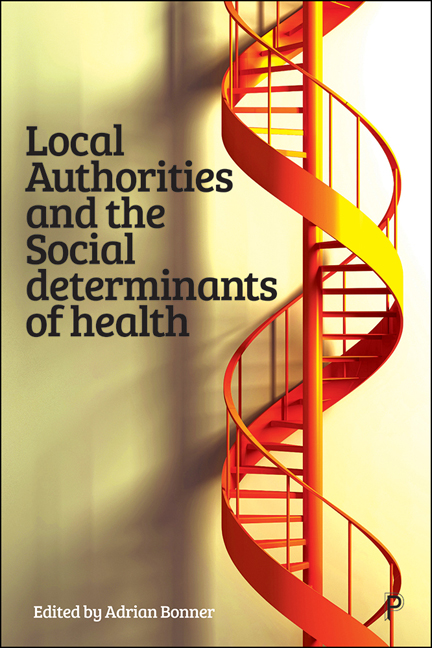Book contents
- Frontmatter
- Dedication
- Contents
- List of Figures, Tables and Boxes
- Notes on Contributors
- Acknowledgements
- Foreword
- Summary
- Introduction: Key Sociopolitical Changes Affecting the Health and Wellbeing of People
- Part I Health, Social Care and Community Wellbeing
- Part II The Role of Local Authorities in Promoting Health and Wellbeing in the Community
- Part III Local Authority Commissioning
- Part IV The Third Sector
- Part V Socio-Economic Political Perspectives
- Conclusion
- Appendix: COVID-19 Timeline
- Index
2 - The Role of English Local Authorities in Addressing the Social Determinants of Health: A Public Health Perspective
Published online by Cambridge University Press: 25 March 2021
- Frontmatter
- Dedication
- Contents
- List of Figures, Tables and Boxes
- Notes on Contributors
- Acknowledgements
- Foreword
- Summary
- Introduction: Key Sociopolitical Changes Affecting the Health and Wellbeing of People
- Part I Health, Social Care and Community Wellbeing
- Part II The Role of Local Authorities in Promoting Health and Wellbeing in the Community
- Part III Local Authority Commissioning
- Part IV The Third Sector
- Part V Socio-Economic Political Perspectives
- Conclusion
- Appendix: COVID-19 Timeline
- Index
Summary
Introduction
While the term ‘social determinants’ would have been alien to local government in England at the time of the Public Health Act 1848, the concepts and actions would have been well understood and core to its activities. Parks, decent housing, education, libraries and more have been the staple work of local authorities for many decades. This chapter explores the social determinants of health through the lens of directors of public health in local government – and considers the challenges and opportunities today, and in the years ahead.
The focus is largely on England because of different legislative and constitutional contexts in the four nations of the United Kingdom (UK). At the time of writing, life expectancy is stalling (ONS, 2018) and health inequalities are worsening; with the gap in life expectancy between the richest and poorest areas of England and Wales widening over the past decade (ONS, 2019).
The conditions that create good health are more social than personal (Marmot, 2010). While genetics, individual behaviour and medical services, such as the UK's National Health Service (NHS), contribute to our health outcomes, the dominance given to these factors is more rooted in cultural and ideological prejudices than evidence. These drivers are over-represented when it comes to public health policy and investment decisions.
Health care contributes a significant but small proportion of the public's overall health – and in the UK, the NHS is free at the point of need for all. It is the unequal social, economic and environmental circumstances throughout a person's life course that contribute to enduring and widening inequalities in health. But current government policy on the NHS and prevention seems to privilege both clinical measures and NHS funding over social determinants (House of Commons Health Committee, 2016; Fell and McManus, 2020). This reliance on clinical prevention over addressing social determinants hampers the effective addressing of health inequalities (Milne, 2018.)
This dual imbalance, worsening health inequalities and a move to clinical measures rather than funding action on social determinants, has been made worse by years of austerity and sustained cuts to local authority, voluntary and community sector-provided services and interventions – including youth clubs, children's centres, social care provision and much more besides. Yet despite experiencing considerable funding cuts, local government continues to play a critical role in shaping the social determinants of health.
- Type
- Chapter
- Information
- Local Authorities and the Social Determinants of Health , pp. 33 - 48Publisher: Bristol University PressPrint publication year: 2020



